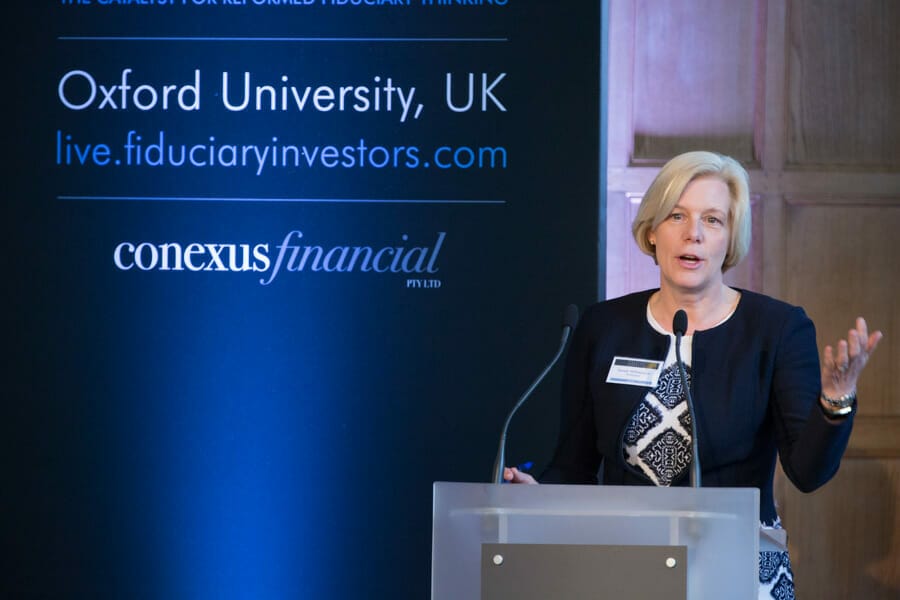Investing in China is as tantalising as it is challenging. China is the biggest driver of global growth and there is no shortage of opportunity. More households are shifting from low-income to middle-income levels, it has a well-functioning market economy and it is home to some of the most innovative companies, particularly in the tech sector.
“Ideas actually start in China,” said Olga Bitel, a partner at asset manager William Blair. “It is at the forefront of many technological changes.” Yet, against this backdrop of opportunity sits a challenging reality. Chinese markets are volatile, there are still many state-owned companies, access through the A-shares market is expected to be difficult, and investors say disclosure is an ongoing problem.
Bitel spoke at the Fiduciary Investors Symposium at the University of Oxford in April.
China’s technology sector, populated by companies such as Tencent, Baidu and Alibaba, offers some of the most exciting growth, said Chenggang Shi, managing director and head of equities at China’s sovereign wealth fund, the China Investment Corporation (CIC). He attributed this to China’s “long tail” of internet users. He estimated that China had about 700 million internet users and 500 million mobile internet users.
“This is a large consumer base and a tail that is much longer and thicker than anywhere in world,” he said. He also referred to China’s second-mover advantage, which allowed tech groups to benefit from concepts that had already been tried and tested elsewhere. A third characteristic of the Chinese tech market that makes a compelling case for its growth potential is fierce competition.
“To be successful, you must compete, and the tech sector is the most competitive sector in China,” Shi said. “It means the survivors are big and strong.”
Despite such opportunity, none of the CIC’s $100 billion equity portfolio is invested in China because the fund was set up to invest China’s foreign exchange reserves.
“We would have to exchange dollars to renminbi again, which is against central bank polices,” Shi said.
Bitel and Shi spoke at the Fiduciary Investors Symposium at the University of Oxford in April.
The dominance of China’s tech sector is also reflected in a shift amongst most emerging-market equity investors out of raw materials and extractive sectors and into the IT sector, said Egon Vavrek, fund manager, global emerging markets, at Dutch investment manager APG, which has a €38 billion ($46 billion) allocation to emerging-market equity that accounts for about 8 per cent of its assets under management.
Investors will soon have an opportunity to invest in China via new access to Chinese A-shares. These shares, which trade on the Shanghai Stock Exchange and the Shenzhen Stock Exchange, will include some of China’s most exciting and fast-growing companies, Bitel said.
“Shenzhen is where most of the exciting private-sector companies are listed,” she said. “When you are interested in the China growth story, those are the opportunities.”
In June and September, about 235 China A-shares will be included in the benchmark MSCI Emerging Markets Index.
“The initial allocation will be very small. It takes a while to into the index, but once you are in the share increases happen pretty quickly,” Bitel said.
Problems with transparency and the integrity of data are commonly cited by active investors looking at China. A solution would be to embrace ESG as a tool to properly assess companies, Vavrek argued. APG applies ESG rigour to a portfolio that spans China, Russia, Brazil and India, where its strategy includes providing investee companies with templates, frameworks and the data points it wants to know, to help disclosure. Vavrek called active engagement with corporations a vital tool for assessing the true health of companies.
“Ask the company what its ESG qualities are; go beyond data disclosure,” he said, and added that government disclosure rules were a “loose” window through which to gather meaningful data.
Another way investors could navigate sustainability concerns would be to focus on the sustainability of the asset rather than the company itself, Bitel said.
“More electric vehicles are bought in China than anywhere else in the world,” she said. “These vehicles are made by foreign companies, but they are also made by local companies.”
She said recent political changes in China were indicative of the country gearing up for future growth. The Communist Party recently announced its plan to abolish presidential term limits, which would have required Xi Jinping to step down as head of state in 2023. In another change, party discipline is now applied across ranks.
“Disciplinary procedures are no longer subject to local authorities, or rank and tenure in the party,” Bitel said. This underscores a centralisation drive that will take China on a new course.
“It is a realignment and reprioritisation of the government function and objectives towards safeguarding and delivering the growth China is capable of,” she said.




